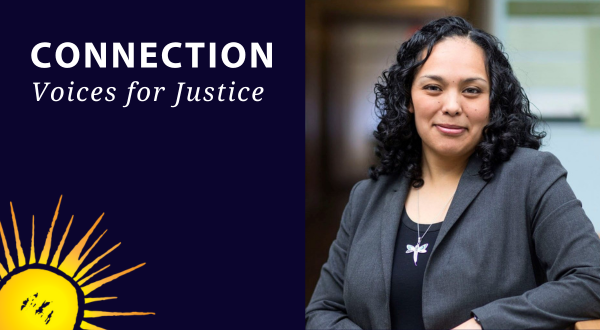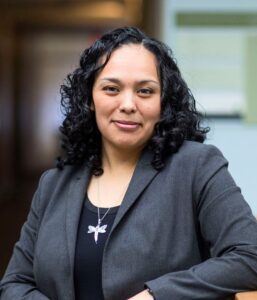
Faith in Democracy
Nichole Flores on Catholic Teaching’s Power to Fight Hate
December 20, 2023
Dr. Nichole Flores is an associate professor of religious studies at the University of Virginia. Her work focuses on issues of justice, democracy, migration, family, gender, and economics. She is Catholic, Latina, a wife, a mother, and like so many residents of Charlottesville, she witnessed the unthinkable when white supremacists with tiki torches marched on her city in 2017 and killed one young activist, Heather Heyer.
Dr. Flores recently spoke with NETWORK about democracy, public theology, and community in the wake of the Charlottesville attack. The following is an excerpt of that conversation.
How did your early life steer you toward teaching and writing on religious studies and Catholic ethics, justice, and democracy?
NF: I think the originating event was bearing witness to the faith of my grandmother, Maria Guadalupe Garcia Flores. Like so many of us, I was inspired by my grandmother’s faith, which passed on to me in a really profound way.
When I began studying theology, I realized that to be a Latina theologian and to have witnessed what I had witnessed in my grandmother’s life, in the lives of my family, and in my community meant that theology necessarily had a public and a social orientation. I had to pay attention to those things that were most challenging for our communities, and to think about them theologically. What does theology have to say about poverty, about anti-immigrant sentiment, about racism? That guided me in this direction, in addition to just an innate love for politics.
Can you tell us about your experience of the events in Charlottesville in August 2017?
NF: My narrative of these events is deeply informed by the activists and specifically the religious activist community in Charlottesville, of which I count myself a part. One of the young activists at the forefront of the response, who also happens to be one of my former students, Zayana Bryant, likes to say, “Charlottesville is not just a moment, it’s not just a hashtag, it’s a movement.”
It’s important to understand that local activists refer to not just that day of August 12 but to that summer as the “Summer of Hate” in Charlottesville. There were several rallies leading up to August 12. The community was very aware that the Unite the Right rally was being organized and was trying to sound the alarm bells early on. I think the rest of the world was really surprised by what happened. But those who had been paying attention in Charlottesville were not at all surprised. And that was even more devastating, because a lot of people put in a lot of energy trying to mobilize religious communities and activist networks, and get more support in town. Those connections didn’t really materialize at the level that could have made a difference and saved more lives. So that’s a part of the story.
At the time, I had just found out that I was pregnant with my first child. I had flown to Denver with my husband to share the news with my family. We watched all of this unfolding from 2,000 miles away, which was difficult, especially given that we had been concerned and had tried to show up in protest earlier in the summer. The local truly became national and global in that moment.
Because of our experiences in Charlottesville, our community was not terribly surprised by what happened on January 6. It resembled very closely what we had survived in our town, including the lead up, the kind of violence, and the people who were involved with the violence. It’s interesting how that on-the-ground experience has shaped the consciousness of our community. We have this devastating, first-hand knowledge of what can happen when we don’t take these threats seriously.
What has happened since then?
NF: Charlottesville is just like any other city with a lot of welcome but also challenging diversity in experience, politics, and socioeconomics. The Catholic community in Charlottesville, with just a handful of parishes, has everybody from frontline leaders of the resistance who put their lives on the line for Black Lives Matter, to people who were writing and talking about it, like me, to people who were horrified but didn’t really do anything in terms of direct action, to people who were kind of neutral. These people are all Catholic, and we’re all communing together.
This has been a real challenge for me not just in my calling as a Catholic theologian, but also in my calling as a Catholic mom who goes to Mass and participates in my parish because I want to love the people in my community as Christ loves. It is really, really challenging when I see openness to these ideologies that are a threat to my community, especially to our Black and Jewish siblings, who were very explicitly targets. In Catholic Social Teaching, solidarity is a virtue. An approach of solidarity helps me to hold all of these challenging things. I love the people sitting in the pews next to me, but I also strongly object to many of the ways that people have responded to this incident.
Even though I’ve been concerned and even disappointed at times by the response of our Catholic community in Charlottesville, the movement has really unfolded and been committed to making Charlottesville a better place to live in a broader, more comprehensive way. Responding to instances of white supremacy, successfully campaigning to remove Confederate statues that mark public space in our town as unsafe for Black and Brown people, providing support and community for migrants and refugees, advocating better zoning laws so more people can afford to live with dignity in the city where they work… — there is so much great work happening in Charlottesville in response to this event that I think is really inspiring.
You mentioned watching these events while pregnant. What are the lessons or insights you want to pass down?
NF: Because that baby is now 5 years old, I think about this a lot, and the importance of teaching him that he belongs to this community and thus has responsibility for things that maybe he wasn’t even born for. I’m trying to instill an awareness that these injustices exist, but not stopping there — that he has power and responsibility for responding to them. What does this world look like when all our friends are valued and their dignity acknowledged in ways that lift them up?
How can public theologians change the discussion around democracy in the U.S.?
NF: Those who are reflecting theologically in this context of a democracy that’s being tested have the opportunity to set the discourse. As someone in a public university where I teach mostly non-Catholic students, I think there are resources from within our beautiful, multifaceted Catholic tradition that can help our entire society to think well about the challenges that we are facing in a democracy. Now, in a political environment where a lot of people are justly on guard for the creeping theocracy, we have to be very wise and judicious about how we introduce resources for public consideration. But I do think it can be done.
I wrote a book on Our Lady of Guadalupe. Her symbol, even though it is profoundly Mexican and super Catholic, appeals to so many people and invites them to think about what justice and flourishing means. Cesar Chavez and the United Farm Workers were able to show other activists and organizers how a symbol, a very particularly religious symbol like Guadalupe, could be so powerful for people who had never heard her story.
Can religious arguments really change people’s minds?
NF: I think that they have and they can, but it is a process of communication and of making them accessible to the public. And that’s one of the things that I very much admire about NETWORK’s work in the community.
How can our concepts be relayed in a way that neither waters them down nor alienates people? Catholic Social Teaching is a wonderful place to start because these concepts are profoundly Catholic, but they also resonate with people who are not Catholic. If we explain clearly what we mean by common good and common life, people are really amenable to that vision. The same with solidarity.
We have a deeply Christ-centered, grounded understanding of solidarity and we can bring the richness, thoughtfulness, and prayerfulness of our tradition to bear on this larger conversation.
You taught a course called “Faith in Democracy.” Where do you find faith and hope in our democracy?
NF: I think back to that experience of being pregnant with this beautiful baby, witnessing devastating events that would rightly make someone feel despair. Why do we do what we do if this is just how people are going to react?
We were bringing life into the world even as these awful things were happening. We had hope in this little person. It’s been very special and profound to watch him grow up, to see the values he’s already been able to cultivate, this little hope, this little light. To see how he has been shaped by this community in ways that are so positive underscores the hope that I have.
I’m kind of obsessed with Advent, because it’s a season where we reflect deeply on what it means to gestate and to give birth. In doing that, we create room for another person. And that’s a profoundly democratic thing to do, right? And a profoundly Catholic thing to do. There’s a lot of richness there, and that continues to motivate me even when things are decidedly still difficult in our society.
Hear more of this conversation on the Just Politics podcast.








